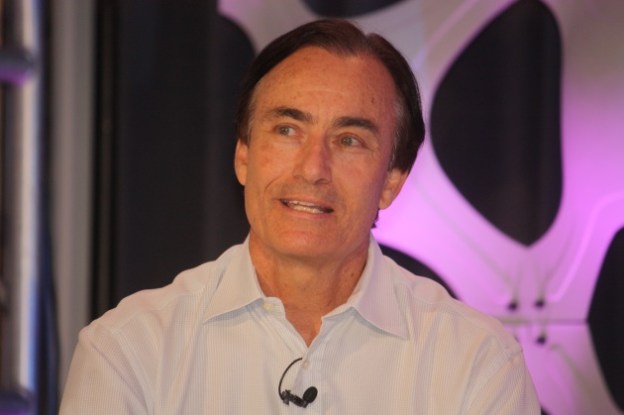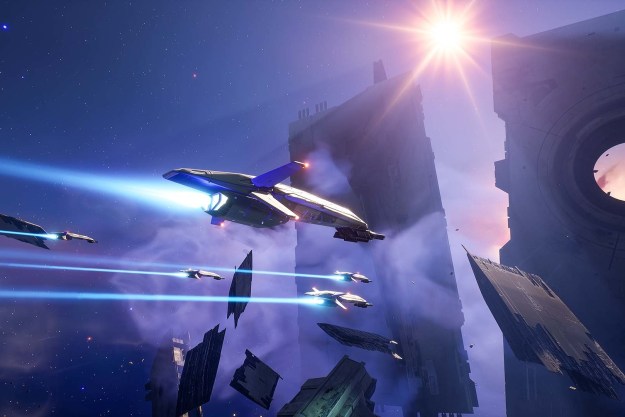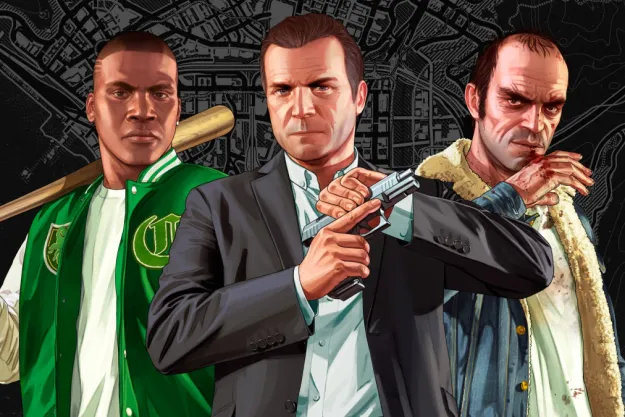
Trip Hawkins has had a few setbacks. After leaving EA in 1991, all of his ventures have struggled. His first post-EA game company, 3DO, went bankrupt in 2003 after Sony crushed its 3DO games console with the original PlayStation. After that, he formed Digital Chocolate, a mobile games company, which has struggled to turn a profit and carve itself a niche for eight years.
Speaking at this week’s GamesBeat 2011 conference, Hawkins boldly claimed that Nintendo’s licensing model has done nothing but harm the video game industry since 1985, hurtling it into the “dark age” in the 1980s. Being that DChoc is now a Facebook developer, what Hawkin’s answer to this problem? Free social games, like those made by Zynga, will bring us out of these dark times, he claims.
“I think we actually had our golden age when game development was using floppy disks and it was an open free platform when we could all make games like we wanted to make,” said Hawkins at the GamesBeat conference in San Francisco. “Nintendo came along and software licensing came in and we’ve been in a dark age since then….How many great companies have been built on the World-Wide Web, which is an open platform. The list just goes on and on, and Nintendo’s been doing things this way for 25 years and there are no great companies that have been built on the back of Nintendo.”
Rewriting history

We’re also not sure what Hawkin’s considers a “great company.” Dozens of multimillion dollar publishers and hundreds of smaller publishers have grown into major success stories due to Nintendo’s licensing model, including EA, the company he founded. In addition, Hawkins of 1991 must have believed in Nintendo’s vision, because when he formed his second company, 3DO, the entire company revolved around Nintendo’s business model. Partnering with Panasonic, the 3DO REAL Interactive Multiplayer system was a closed platform with licensing fees as well. Of course, it failed due to competition with Atari, Nintendo, Sega, and Sony’s new PlayStation system, but that can’t be considered a failure of licensing, as all those competitors used the same closed system as well.
Indeed, after 3DO’s console failed in 1996, the company became a third-party publisher and still found quite a bit of success in its Army Men, BattleTanx, and Might & Magic franchises. When 3DO finally went bankrupt in 2003, it wasn’t the licensing system that did it; it was the stream of bad games and poor investments Hawkin’s himself had made. 3DO spent too much and made too many bad games and, much like Atari, consumers lost confidence in the publisher’s product.
When he founded Digital Chocolate in 2003, Hawkins made it a mission to bring original, quality, non-branded games out to mobile phones. Struggling with the phone market for several years, the company now develops games for feature phones, iOS, and Android, three platforms that could also be considered somewhat closed (especially the carrier-controlled feature phone market). Its newest initiative, however, is social gaming. Hawkins has positioned the company to mimic Zynga and set up shop on Facebook. Finally making some steady revenue from hooked social gamers, Hawkins has changed his tune and seems to blame his failures not on himself, but on the games industry that bore him.
Of course, it could be argued that there would be no Zynga or Facebook games if not for the massive success of Nintendo’s licensing system. Thanks to it, games have become so popular that people want to play them everywhere.
But is Zynga the future?
Many in the industry, including Hawkins, seem to believe that Zynga and its model of free-to-play games represents the future of games. Some even predict the death of gaming consoles and pay-to-play RPGs all together. While that may come to pass, perhaps we should cool our jets. Zynga is still less than three years old and derives a great deal of its revenue from one social network: Facebook, which could change its policies at any time. The publisher has found immense success with its FarmVille and CityVille games. So much so, in fact, that console gaming companies like Valve, EA, Activision, Ubisoft, Microsoft, and others want in on the cash train. But how long will the trend last? Are we experiencing a social gaming bubble of popularity, or is this marking a true shift in the direction of the industry?
If the industry is indeed heading down a road where all games are free-to-play, but loaded with microtransactions and ads, I’d argue that Zynga isn’t leading us out of the “dark age” of games: It’s opening the doors to another possible crash of the games industry.
While games have become a varied lot (everything wants to call itself a game these days), free-to-play games are designed to bleed money out of players slowly, and instill social pressure to continue playing, forever. One might argue that MMORPGs like EverQuest and World of Warcraft brought popularity to the idea of the neverending game, but at least in those games everybody pays the same monthly entrance fee. Their skills are defined by what they accomplish inside of the game, not what they pay for.

Free-to-play games coerce players into spending real money on in-game items. For a multiplayer game, introducing money as a gameplay element is dangerous and creates an environment where those who have more money can dominate and defeat those who don’t. Calling FarmVille a ‘game’ is somewhat deceptive; it’s more like a store. If you pay for enhancements instead of earning them, then you aren’t playing a game at all. Strapped for cash due to slowing console sales (which could be attributed to a lack of originality or high prices), many big publishers don’t care about the ethics of Zynga-style games and are already modifying popular classics like Sim City and Civilization to be playable in this social context. GamePro recently reviewed Sid Meier’s Civilization World for Facebook, and found it more social than Civ. Do we want all of our classic games remodeled and filled with social incentives to pay for things instead of earn them?
Critics of video games have long pointed toward their addictive qualities, sometimes comparing them to drugs, or saying they turn children into zombies. Sadly, with many of these free-to-play social games, we may actually be able to find out, in dollars, how addicted players are, with publishers becoming virtual drug dealers, dispensing a single hit of Smurfberries for the low price of $4.99.
Hawkins is an opportunist

Still, I may be as wrong as Mr. Hawkins is misguided. Perhaps cheap, free, social games are the future and they will kill off the business model Nintendo created. So far though, most of these social games seem to be fairly identical to one another in structure and gameplay. If you don’t like one, you may not like any of them. This is beginning to change with series like World of Tanks, but under the gloss, the game is still fueled by cash, not skill.
Unfortunately, Trip Hawkins does not care. His 3DO console may have embodied the licensed console business he criticizes so vehemently today, and EA may be one of the largest console publishers, but Trip’s money is in social games now. Digital Chocolate is the #12 games publisher on Facebook, with 17.6 million addicted users and counting.
Still, though he talks glowingly of Zynga now, his company is far from the 271 million users Zynga attracts each month. It may not be long until Trip Hawkins tells us the mythical tale of how Zynga, the company that he now emulates, ruined the video game industry.


